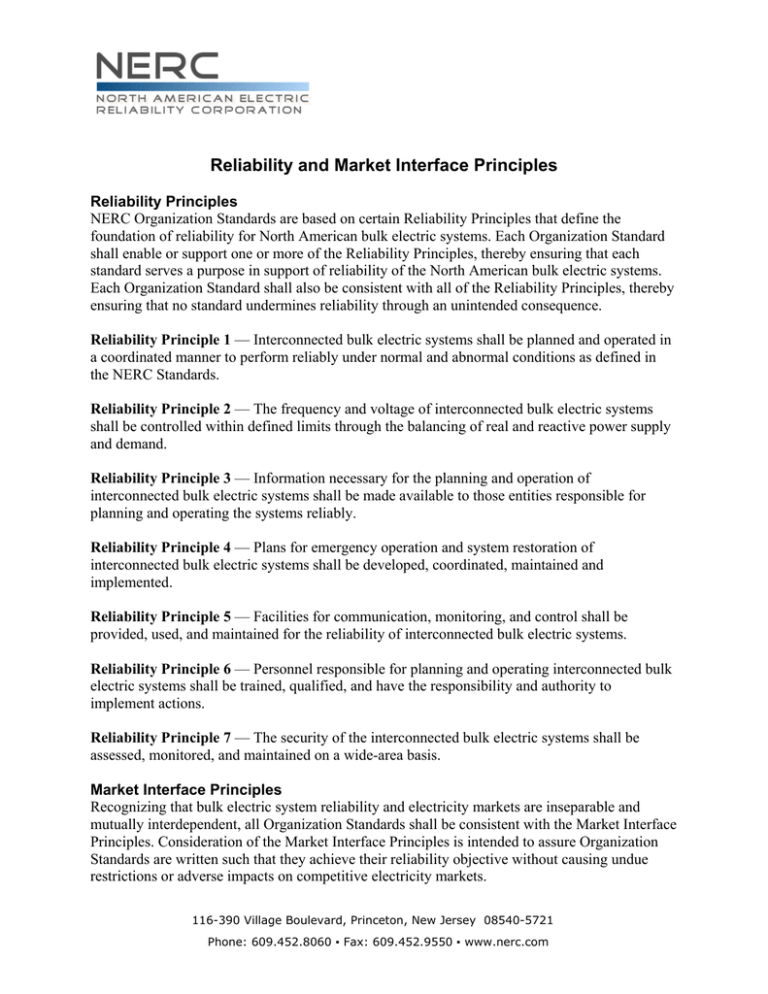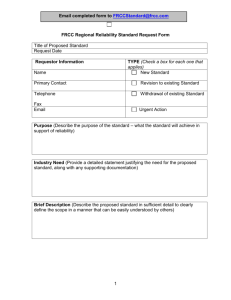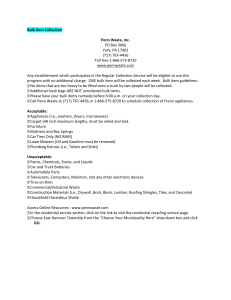Reliability and Market Interface Principles
advertisement

Reliability and Market Interface Principles Reliability Principles NERC Organization Standards are based on certain Reliability Principles that define the foundation of reliability for North American bulk electric systems. Each Organization Standard shall enable or support one or more of the Reliability Principles, thereby ensuring that each standard serves a purpose in support of reliability of the North American bulk electric systems. Each Organization Standard shall also be consistent with all of the Reliability Principles, thereby ensuring that no standard undermines reliability through an unintended consequence. Reliability Principle 1 — Interconnected bulk electric systems shall be planned and operated in a coordinated manner to perform reliably under normal and abnormal conditions as defined in the NERC Standards. Reliability Principle 2 — The frequency and voltage of interconnected bulk electric systems shall be controlled within defined limits through the balancing of real and reactive power supply and demand. Reliability Principle 3 — Information necessary for the planning and operation of interconnected bulk electric systems shall be made available to those entities responsible for planning and operating the systems reliably. Reliability Principle 4 — Plans for emergency operation and system restoration of interconnected bulk electric systems shall be developed, coordinated, maintained and implemented. Reliability Principle 5 — Facilities for communication, monitoring, and control shall be provided, used, and maintained for the reliability of interconnected bulk electric systems. Reliability Principle 6 — Personnel responsible for planning and operating interconnected bulk electric systems shall be trained, qualified, and have the responsibility and authority to implement actions. Reliability Principle 7 — The security of the interconnected bulk electric systems shall be assessed, monitored, and maintained on a wide-area basis. Market Interface Principles Recognizing that bulk electric system reliability and electricity markets are inseparable and mutually interdependent, all Organization Standards shall be consistent with the Market Interface Principles. Consideration of the Market Interface Principles is intended to assure Organization Standards are written such that they achieve their reliability objective without causing undue restrictions or adverse impacts on competitive electricity markets. 116-390 Village Boulevard, Princeton, New Jersey 08540-5721 Phone: 609.452.8060 ▪ Fax: 609.452.9550 ▪ www.nerc.com Market Interface Principle 1 — The planning and operation of bulk electric systems shall recognize that reliability is an essential requirement of a robust North American economy. Market Interface Principle 2 — An Organization Standard shall not give any market participant an unfair competitive advantage. Market Interface Principle 3 — An Organization Standard shall neither mandate nor prohibit any specific market structure. Market Interface Principle 4 — An Organization Standard shall not preclude market solutions to achieving compliance with that standard. Market Interface Principle 5 — An Organization Standard shall not require the public disclosure of commercially sensitive information. All market participants shall have equal opportunity to access commercially non-sensitive information that is required for compliance with reliability standards. Page 2 of 2

